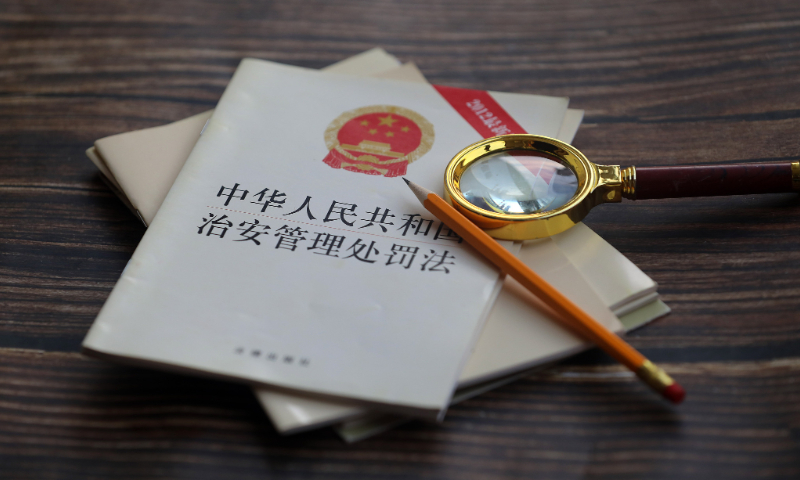Top legislature to enhance comprehensive legislation on public security law, including punishment for actions that 'hurt national feelings'

As Chinese lawmakers move to revise the Law on Penalties for Administration of Public Security to better adapt to current social realities, debates have been escalating in recent days over a clause that stipulated punishment on people wearing clothes that "hurt the feelings of the Chinese nation." Photo: VCG
Opinions and suggestions from the public regarding the draft law for consultation, including those concerning the highlighted provisions, will be carefully reviewed by the legislative agencies of the Standing Committee of the National People's Congress, said the spokesperson for the NPC Legislative Affairs Commission on Monday, adding that they will put forward sound suggestion for revisions, improvements and appropriate handling.
As Chinese lawmakers move to revise the Law on Penalties for Administration of Public Security to better adapt to current social realities, debates have been escalating in recent days over a clause that stipulated punishment on people wearing clothes that "hurt the feelings of the Chinese nation."
Legal experts and social observers urged clarification on its definition and applicable scenarios to avoid possible excessive enforcement.
According to clause 34 of the draft, a person is subject to 5-10 days of detention and a fine of 1,000 ($137) to 3,000 yuan if the person wears, or forces others to wear clothes or signs that "jeopardize Chinese national spirit or hurt national feelings."
Those who slander and discredit the spirit and deeds of heroes and martyrs, beautify the war of aggression, or harm the public interest will also be punished according to the law. The clause targets provocative actions that aim at attracting public attention, such as wearing the uniform of Japanese invasion troops at sensitive sites or tainting tombstones of martyrs, which have precedents.
The draft of the revision was deliberated by China's top legislature on August 28 and then published to solicit public opinions by September 30 before the legislation procedure.
Zhao Hong, a professor at the China University of Political Science and Law, wrote online on Wednesday that the severity, scale and social impact of acts that "hurt national feelings" should be made clear in legislation. Otherwise, certain actions may be over-interpreted, resulting in a violation of individual rights.
Other legal experts say it is not legally feasible to authorize an entity to determine whether feelings have been hurt. The vagueness of the clause could lead to selective enforcement of law, abuse of power, and could even fuel populism or extreme nationalism.
The clause is made to defend Chinese national dignity and feelings, but some internet opinions could be extreme and press for stricter law enforcement, Hu Xijin, a Chinese media professional wrote on the Chinese social media platform Sina Weibo.
The development and prosperity of the country require an inclusive and relaxing social environment, and legislation should provide people with security and certainty. New policies should target specific issues and also avoid being subject to misinterpretation, he wrote.
Draft laws reviewed by the NPC Standing Committee are regularly open to public consultation of opinions. According to the Legislation Law, the draft law should be open for public opinion for a period generally not less than 30 days, and the solicitation of opinions should be reported to the public.
The Standing Committee of the 14th National People's Congress held its fifth session from August 28 to September 1, deliberating the draft laws, including the Preschool Education Law and the Law on public security administration penalties, and posted the full text on the NPC website for public opinion from September 1 to September 30.
Global Times

